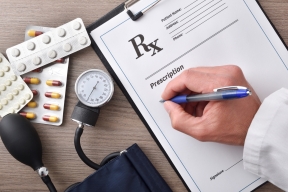Why Should I Take Blood Pressure Medication?
Medically Reviewed by John W. Patton, IV, MD
More than 119 million American adults have high blood pressure. Unfortunately, only about 1 in 4 of those people have their condition under control. McLeod cardiologist Dr. John Patton explains how blood pressure medications work and why it’s imperative for patients to take them on a regular basis.
High Blood Pressure: What Does It Mean?
High blood pressure is also known as hypertension. It happens when the force of your blood pushing against the walls of your blood vessels is too high. High blood pressure is often called ‘the silent killer’ because, for many people, it has no symptoms. Checking your blood pressure is the only way to know if it is too high.
Why is High Blood Pressure Dangerous?
When blood pressure is high for too long, it can damage the walls of blood vessels, causing them to develop tiny tears. To fix these damaged areas, the body sends special cells that stick to the site. Over time, substances such as cholesterol and fats may also build up at these damaged spots, forming plaque that can make the inside of your arteries narrow, which pushes your blood pressure even higher.
If left untreated, high blood pressure can cause a number of serious medical issues:
- Stroke
- Heart failure
- Heart attack
- Vision loss
- Kidney disease and failure
- Sexual dysfunction
Consistency is Key with Medication
Many people need to take medicine in addition to making lifestyle changes to help keep their blood pressure at healthy levels. Medication performs several important functions; it can keep blood pressure at a healthy level by causing your body to get rid of water, which decreases the amount of water and salt in your body to a healthy level. Medication also relaxes your blood vessels and helps your heart to beat with less force. Finally, blood pressure medication blocks nerve activity that can restrict your blood vessels.
Missing a single dose of blood pressure medication is usually not cause for alarm. Just take it as soon as you remember. However, failing to take blood pressure medication as prescribed for an extended period of time could raise your chance of a heart attack or stroke.
If unpleasant side effects from the medications are making you reluctant to continue, talk to your primary care provider. Never stop taking blood pressure medications on your own. Any medications can cause side effects, and blood pressure medications are no exception.
To learn more about managing your blood pressure, talk with a primary care provider near you.
-
McLEOD REGIONAL MEDICAL CENTER FLORENCE
843-777-2000 -
McLEOD DARLINGTON
843-777-1100 -
McLEOD DILLON
843-774-4111 -
McLEOD LORIS
843-716-7000 -
McLEOD SEACOAST
843-390-8100 -
McLEOD CHERAW
843-537-7881 -
McLEOD CLARENDON
803-433-3000



-
McLEOD REGIONAL MEDICAL CENTER FLORENCE
843-777-2000 -
McLEOD DARLINGTON
843-777-1100 -
McLEOD DILLON
843-774-4111 -
McLEOD LORIS
843-716-7000 -
McLEOD SEACOAST
843-390-8100 -
McLEOD CHERAW
843-537-7881 -
McLEOD CLARENDON
803-433-3000
 Find a Doctor
Find a Doctor  Locations
Locations  Services
Services 